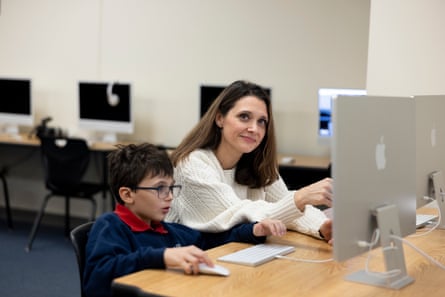
A software entrepreneur wants to empower players to develop their own games
Maria Burns Oritz develops software for Indigenous communities – now she she wants to democratize game development
Long before trumpeting the need to pair profit with progressive philosophies became a cornerstone of corporate America, Maria Burns Oritz believed in building the type of businesses that will do well and do good. Even before its official inception in 2015, her Minneapolis-based gaming company 7 Generation Games was a side hustle focused on developing software and gaming platforms that served the needs of underrepresented populations.
“We want to help close the education gap,” says 41-year-old Burns Oritz, who co-founded the company with her mother, tech veteran and judo champion AnnMaria Waddell (Burns Ortiz’s sister is wrestler, Olympian and video game aficionado Ronda Rousey). Many of the games from 7 Generation are made for members of Native American tribes that live within the company’s surrounding communities across the midwest. “We focus on more diverse voices and content both because they are absent from so many curricula and because no one else on the market was doing this,” says Burns Ortiz.

Her 10-person team develops ambitious and entertaining educational games that help users learn about everyday subjects such as math, science and financial literacy. A former journalist, Burns Ortiz helped lead her firm’s initial funding efforts, which included a trio of Kickstarter campaigns and venture-capital pitches, gaining support from the Goldman Sachs 10,000 Small Businesses Program, which helps companies like hers grow.
The fundraising process was not fun. “Few founders say it publicly, but fundraising is the worst,” Burns Ortiz says. “Investors want rapid scale, and ours is an industry where growth is traditionally slower. It needs to be because if our solution doesn’t work, we’re not talking about failed overpriced juicers, we’re talking about kids’ education.”
Her initial funding success is particularly notable considering that female founders receive less than 3% of all venture capital investment, according to a recent article in the Harvard Business Review. “We’re a Latina-founded company, and our identity has unquestionably shaped what we do,” says Burns Ortiz. “We know what it is like to be taught a curriculum that doesn’t reflect you.”
Tribal customs, artistry and languages often factor into games produced by 7 Generation for native communities. “Sometimes these languages can even be on the verge of extinction,” she says.
Since its establishment, 7 Generation has developed a total of 26 games – including one of its most successful, Making Camp, which has spawned an entire series since the original’s 2016 inception. 7 Generation mostly works with clients to develop games with specific audiences and subject focuses. But Burns Ortiz is preparing to shake up her company’s entire product and revenue model.
Burns Ortiz insists there’s a better, more equitable and more sustainable approach to bespoke gaming – and her firm is committed to implementing it. Over the next few months, the company will open up and democratize game development via an open-source software platform called 7 Gen Blocks. For a licensing fee as low as $20 a month, anyone will be able to design their own games.
“Our old model centered around someone paying us to make an educational game for them, a one-time sale at a cost inaccessible to most of the education market,” explains Burns Ortiz. “7 Gen Blocks is a low-code/no-code platform that software developers can download the way you would Photoshop or Microsoft Office.”
She envisions the platform as able to do for game-building “what WordPress has done for website design or Canvas has done for graphic design”, and she envisions her new product will “provide access to game design with the lowest barrier to entry”. While 7 Generation will continue to develop bespoke games, Burns Ortiz says her goal is that the new open-source system will eventually comprise the lion’s share of the business, estimating that portion of revenue will reach over $20m within five years.

But there are causes for concern. “In opening up the platform, we have to accept giving up some of that [quality] control in order to empower new game creators,” Burns Ortiz says. There is also the question of how she will get the word out to existing and new clients alike and let them know about her new product offering, which will allow them to design games that reflect their players’ lives. In addition to the game-building tools, a subscription will come with training and teaching strategies. “The last thing we want are games that do not work,” Burns Ortiz says.
The Guardian spoke with three experts about her project and the hopes and fears that it stirs up.
Laurel Touby

Investor in early-stage startups and founder of MediaBistro, which she sold in 2007 for $23m
One of the most effective ways to gain awareness of a product offering is to organize an IRL (in real life) viral marketing party. There’s nothing like having an old-fashioned launch party to bring attention to a new initiative. The party should feel intentional in design and execution: invite current customers and make sure you choose a facility with top audio-video equipment so you can really show off a few of the niftiest features of the new product line. Be sure to invite guests individually and ensure they feel uniquely involved in the event. And don’t forget to take every available opportunity to expand your network: while sending out those initial invites, ask folks if they have any friends you who they think might also appreciate what you are building. The best way to entice new customers is through word of mouth.
Alex Tapscott

Blockchain and crypto expert and author of Web3: Charting the Internet’s Next Economic and Cultural Frontier
If done correctly, 7 Generation Games’ plan to open its software so that others can build their own games will help the company fulfill its goal of empowering and educating underserved communities. As a platform company, rather than a product company, it can also achieve far greater scale as a business.
However, there are several challenges. First, existing customers rely on 7 Generation for their game-making expertise, and may not feel capable of creating games themselves. The company must be prepared to provide support and training. Second, it runs the risk of confusing the market with the switch. A clear education campaign and a gradual approach is a sensible one. Finally, the company must be able to attract new game developers to build on its platform. It has a powerful message and a compelling call to action for new developers: build with our toolkit and help the overlooked and underserved. The company should lean into that and separate itself from the pack.
Marcus Glover

Managing director of Lockstep Ventures, which focuses on early-stage investments in tech companies with a social-justice focus
Companies like OpenAI and its ChatGPT project are among the most globally recognized companies with free online offerings to assist customers with their queries. With that in mind, the integration of AI into the 7 Generation Games platform could be a gamechanger, offering customers a dynamic toolset guided by intelligent algorithms. Enhancing 7 Generation Games with an AI engine could facilitate intuitive game creation. With the simple maneuver of incorporating AI into their platform, 7 Generation Games could create a new perception of the company by offering “AI-enabled” products. This would provide present and future customers with the confidence they need to become active and engaged users of their products.
The choice
Burns Ortiz connected with the insights offered by Tapscott. “He hit on topics that we had been thinking a lot about internally, and I appreciated how he laid out steps to tackle them,” she says.
His input strongly emphasized a need to provide the support and training that users will inevitably require once 7 Generation rolls out its new product offering. “Fortunately, one of our strengths is we’re good at educating people,” Burns Ortiz says. To this end, she notes that the company will need to be just as mindful about the education aspect of the product as platform development. Whether it’s providing answers for FAQs and how-to videos – along with access for customers for support from an actual human – getting new game creators engaged with the product will ensure success as much as the platform’s functionality. “Maybe we even create an educational game on how to make an educational game,” she says.



